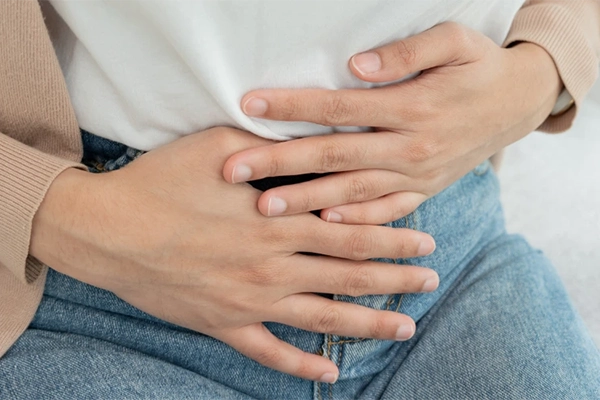Topics
Causes of Constipation and How Diet Can Help
-
Poor Fibre Intake and Its Impact on Bowel Movements
Fibre adds bulk to stool, aiding smooth passage through the digestive system. A lack of fibre leads to hard stools and constipation. Increasing fruits, vegetables, and whole grains helps prevent painful, infrequent bowel movements.
-
The Importance of Hydration for Digestive Health
Adequate water intake softens stool, making it easier to pass. Dehydration causes the body to absorb fluid from stool, resulting in hard stools. Drinking at least 8 glasses of water daily supports digestive health and reduces constipation risks.
-
The Role of Physical Activity in Bowel Regularity
Exercise stimulates gut motility, promoting smooth stool movement. A sedentary lifestyle slows digestion, causing constipation. Regular activities like walking or cycling can help maintain bowel regularity naturally.
Foods that Naturally Relieve Constipation
Fibre-Rich Fruits: Your Natural Gut Cleaners
- Apples: Rich in soluble fibre (pectin) to soften stool and promote healthy digestion. Eating the skin boosts fibre, making it an easy snack for all ages.
- Prunes: Contain sorbitol, a natural laxative. Studies show they improve stool consistency and frequency, helping with mild to moderate constipation.
- Berries: High in fibre and antioxidants. They add bulk to stool, promote bowel movements, and are low-calorie, making them diet-friendly.
Fibre-rich fruits are excellent for alleviating constipation due to their high water and fibre health content. Apples, prunes, and berries are particularly effective in promoting digestive health.
Whole Grains: Unblock Your System Naturally
- Oatmeal: Provides soluble fibre that softens stool and keeps you full longer, supporting weight management and digestion.
- Whole Wheat Bread: Rich in insoluble fibre, it helps move food through the intestines, ideal for those with sluggish digestion.
- Brown Rice: Retains fibre-rich bran layers, promoting gut health. Easy to include in meals and versatile for different diets.
Whole grains are not only beneficial for digestion but also for maintaining overall health , as they are rich in essential nutrients like vitamins, minerals, and antioxidants.
Fluids: Stay Hydrated
- Water softens stool and prevents dehydration, a key cause of constipation.
Probiotics Aid Constipation Relief
Probiotics are live bacteria that support gut health, particularly when it comes to managing constipation. These beneficial bacteria, found in fermented foods like yoghurt, kefir, and sauerkraut, help balance the gut microbiome, ensuring that your digestive system functions properly. Research has shown that probiotics can reduce the symptoms of constipation by increasing stool frequency and improving stool consistency.
In cases of chronic constipation, the gut microbiome may be imbalanced, meaning that there are fewer good bacteria and more harmful bacteria. Probiotics help to restore this balance, enhancing digestive health and making it easier to pass stool. For those struggling with constipation, incorporating probiotic-rich foods into your diet may offer long-term relief. Individuals with chronic constipation should consult their healthcare providers on probiotic supplements or other treatment options that can be tailored to their specific needs.
FAQs
-
How can stress impact digestive health and lead to constipation?
Stress can slow down digestion, affecting bowel movements and increasing the likelihood of constipation. Managing stress through relaxation techniques can support regularity.
-
What is the recommended daily fibre intake?
The recommended daily fibre intake is about 30g a day.
-
Can sitting for long periods contribute to constipation?
Yes, a sedentary lifestyle can slow digestive processes. Taking breaks to move around during the day can support healthy bowel movements.
-
What is the role of magnesium in digestive health?
Magnesium helps relax muscles in the intestines, promoting smoother bowel movements. Foods high in magnesium include leafy greens, nuts, and seeds.
-
What is faecal impaction, and how is it related to constipation?
Faecal impaction is a severe form of constipation where stool hardens and becomes stuck in the colon. It may require medical treatment.
Book an Appointment at Gleneagles Hospitals
Incorporating the right foods into your diet is one of the most effective ways to relieve constipation and promote overall digestive health. Fibre-rich fruits, whole grains, leafy greens, and probiotic-rich foods can help regulate bowel movements and prevent constipation. Early diagnosis and treatment can prevent severe complications and ensure a swift recovery.
If you have questions about constipation, get in touch with us to book an appointment at your nearest Gleneagles Hospitals to receive professional advice to help kickstart your health journey. To make an appointment for health screening, please contact the health screening centre at the Gleneagles Hospitals nearest to you.








